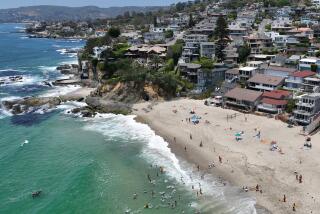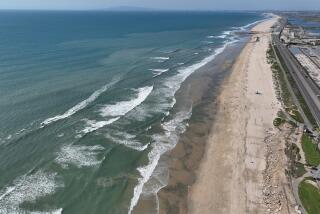Coastline Disaster Creates Sense of Community : Activists: From Greenpeace members to hordes of volunteers, people band together in fight for wildlife.
HUNTINGTON BEACH — As dawn broke on a sparkling Saturday, Huntington Beach was eerily empty. For as far as the eye could see, there were no walkers, no surfers, no couples playing in the waves--only occasional piles of plastic bags stuffed with oil-soaked cloths and soiled sand.
Occasionally, small groups of people ventured toward the surf to check out the damage wrought by Wednesday’s oil spill. But after a few steps on the sand, a disembodied voice would boom from a lifeguard tower: “Attention on the beach. The beach is now closed. Please leave the beach immediately.”
“I come here every day,” said Debbie Goodwin, a nearby resident who was shooed off the beach. “This is where I walk as I set my goals for the day. But look at it now! This is so sad.”
Right after the spill, Huntington Beach officials ordered people to stay out of the ocean. Friday night, officials announced the sand tainted by oily foam would be off limits as well.
But by midday, the curiosity seekers outnumbered the lifeguards. The crowd was solemn as it stood squinting into the sun at yellow-suited cleanup workers laboring in the shadow of the wounded tanker.
“It’s a sad thing for all the wildlife and all the fish, seals and dolphins,” said 60-year-old Paul Petzold, a visitor from Illinois who surveyed the scene from his beach chair. “They can’t look out for themselves so we have to look out for them.”
Up and down the Orange County coastline, the oil spill was the talk of the day. For Greenpeace members picketing at Pacific Coast Highway to nature lovers inspecting fragile wetlands to hordes of cleanup volunteers, the disaster created a sense of community.
Cathy Verlench of Newport Beach arrived at the Newport Pier at 8:30 a.m. to set up a headquarters for volunteers. By 12:30 p.m., she had 500 inquiries.
“It’s been nice,” said Verlench, who was surrounded by a mountain of cardboard boxes for carrying off oil-soaked birds. “We’ve had a lot of high school teen-agers. They’ve been going door to door getting supplies . . . boxes, rags and gloves.”
At the border of Newport and Huntington beaches, the smell of petroleum was strong. Cleanup crews waded into the water swinging bright red, green and blue pompons. The oil sticks to the plastic strands when they are swished in the waves.
“Primitive,” said Norm Kent of Santa Ana as he observed the effort. “It’s really primitive.”
It was a day of frustration for many would-be volunteers who were turned away. Both beach and bird cleanup workers must undergo training before being sanctioned to pitch in.
Sylvia Walcott, a registered nurse who lives in Huntington Beach, came to volunteer at a lifeguard center set up to treat birds that washed ashore.
“They won’t let the volunteers do anything because they’re afraid of liability,” Walcott said. “They have pages and pages of volunteers. . . . They say that they have more volunteers than birds. I think a volunteer would put more heart in it because we’d be here because we want to. It’s beautiful here. It was beautiful.”
More to Read
Sign up for Essential California
The most important California stories and recommendations in your inbox every morning.
You may occasionally receive promotional content from the Los Angeles Times.










